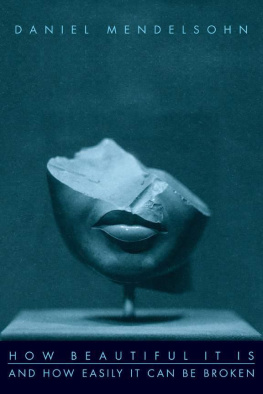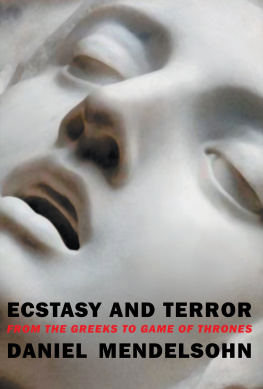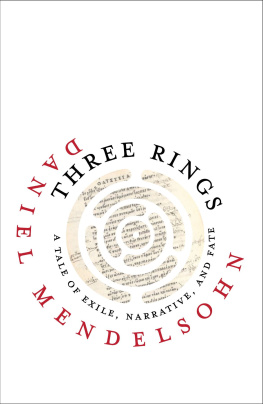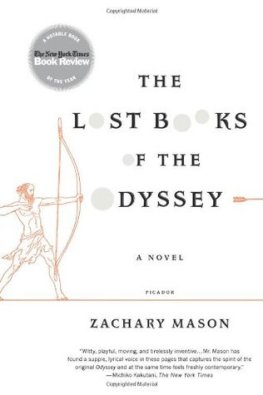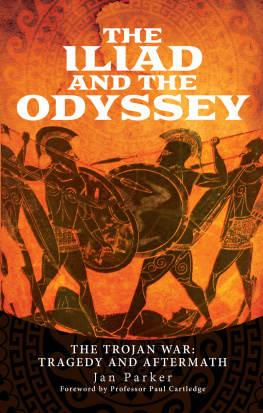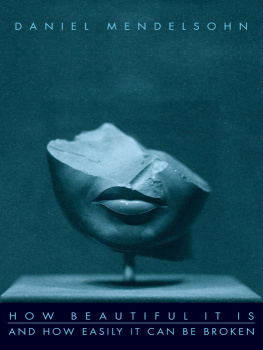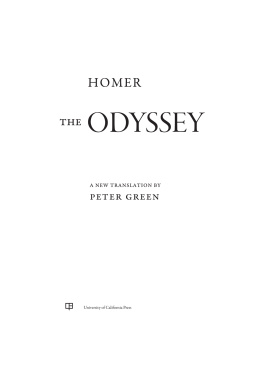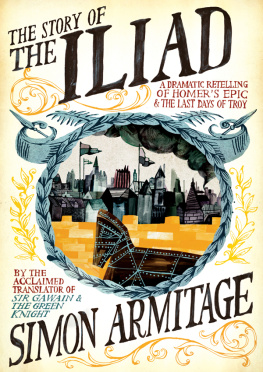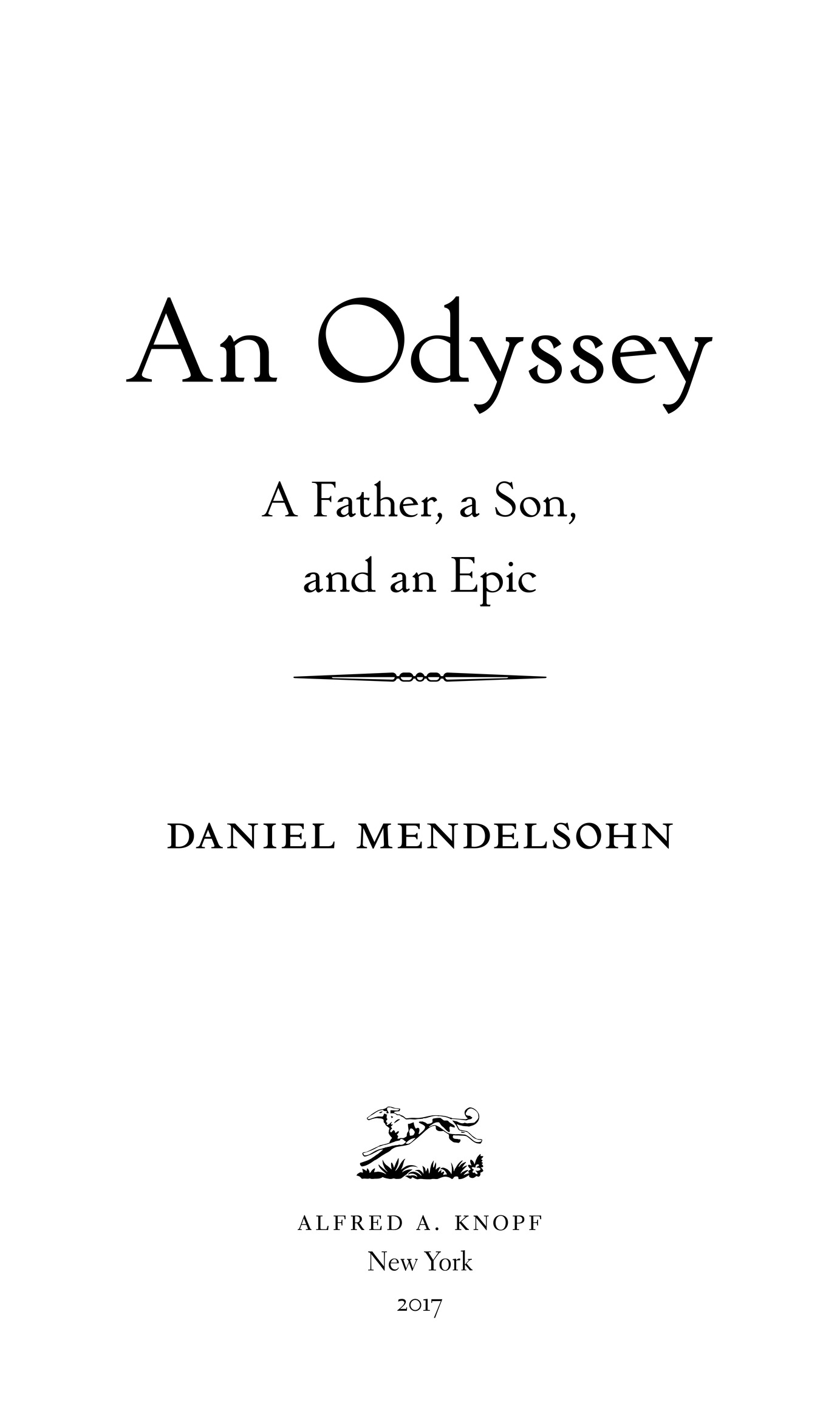ALSO BY DANIEL MENDELSOHN
Waiting for the Barbarians: Essays from the Classics to Pop Culture
C. P. Cavafy: The Unfinished Poems (translation)
C. P. Cavafy: Collected Poems (translation)
How Beautiful It Is and How Easily It Can Be Broken: Essays
The Lost: A Search for Six of Six Million
Gender and the City in Euripides Political Plays
The Elusive Embrace: Desire and the Riddle of Identity
THIS IS A BORZOI BOOK PUBLISHED BY ALFRED A. KNOPF
Copyright 2017 by Daniel Mendelsohn
All rights reserved. Published in the United States by Alfred A. Knopf, a division of Penguin Random House LLC, New York. Simultaneously published in hardcover in Canada by Signal, an imprint of McClelland & Stewart, a division of Penguin Random House Canada Limited, Toronto.
www.aaknopf.com
Knopf, Borzoi Books, and the colophon are registered trademarks of Penguin Random House LLC.
Permission to reprint previously published material may be found following the acknowledgments.
Library of Congress Cataloging-in-Publication Data
Names: Mendelsohn, Daniel Adam, 1960 author. | Mendelsohn, Jay, 19292012.
Title: An odyssey : a father, a son, and an epic / Daniel Mendelsohn.
Description: First edition. | New York : Alfred A. Knopf, 2017.
Identifiers: LCCN 2017011844 | ISBN 9780385350594 (hardcover : alk. paper) | ISBN 9780385350600 (ebook)
Subjects: LCSH : Mendelsohn, Daniel Adam, 1960 | Fathers and sonsUnited StatesBiography. | Odysseus, King of Ithaca (Mythological character)Influence. | Homer. OdysseyInfluence. | Mendelsohn, Daniel Adam, 1960TravelMediterranean Region. | Mendelsohn, Jay, 19292012TravelMediterranean Region. | FathersUnited StatesDeath.
Classification: LCC CT 275. M 46919 A 3 2017 | DDC 306.874/2dc23 LC record available at https://lccn.loc.gov/2017011844
Ebook ISBN9780385350600
Cover art: (waves) Markovka, (meander pattern) spline_x, (boat) Malysh Falko, all Shutterstock.com
v4.1
ep
Contents
For my mother
Authors Note
For the purposes of narrative coherence and in consideration of the privacy of the students in my Odyssey seminar and the passengers aboard the Retracing the Odyssey cruise, names have been changed and a number of details relating to events and characters have been modified.
All translations from Greek and Latin are my own.
PROEM
(Invocation)
19642011
The plot of the Odyssey is not long in the telling. A man has been away from home for many years; Poseidon is always on the watch for him; he is all alone. As for the situation at home, his goods are being laid waste by the Suitors, who plot against his son. After a storm-tossed journey, he returns home, where he reveals himself, destroys his enemies, and is saved.
ARISTOTLE , Poetics
O ne January evening a few years ago, just before the beginning of the spring term in which I was going to be teaching an undergraduate seminar on the Odyssey, my father, a retired research scientist who was then aged eighty-one, asked me, for reasons I thought I understood at the time, if he might sit in on the course, and I said yes. Once a week for the next sixteen weeks he would make the trip between the house in the Long Island suburbs where I grew up, a modest split-level in which he still lived with my mother, to the riverside campus of the small college where I teach, which is called Bard. At ten past ten each Friday morning, he would take a seat among the freshmen who were enrolled in the course, seventeen- or eighteen-year-olds not even a quarter his age, and join in the discussion of this old poem, an epic about long journeys and long marriages and what it means to yearn for home.
It was deep winter when that term began, and when my father wasnt trying to persuade me that the poems hero, Odysseus, wasnt in fact a real hero (because, he would say, hes a liar and he cheated on his wife!), he was worrying a great deal about the weather: the snow on the windshield, the sleet on the roads, the ice on the walkways. He was afraid of falling, he said, his vowels still marked by his Bronx childhood: fawling. Because of his fear of falling, we would make our way gingerly along the narrow asphalt paths that led to the building where the class met, a brick box as studiedly inoffensive as a Marriott, or up the little walkway to the steep-gabled house at the edge of campus that for a few days each week was my home. To avoid having to make the three-hour trip twice in one day, he would often spend the night in that house, sleeping in the extra bedroom that serves as my study, stretched out on a narrow daybed that had been my childhood beda low wooden bed that my father built for me with his own hands when I was old enough to leave my crib. Now there was something about this bed that only my father and I knew: it was made out of a door, a cheap hollow door to which hed screwed four sturdy wooden legs, securing them with metal brackets that are as solidly attached today as they were fifty years ago when he first joined the steel to the wood. This bed, with its amusing little secret, unknowable unless you hauled off the mattress and saw the paneled door beneath, was the bed on which my father would sleep that spring semester of the Odyssey seminar, not long before he became ill and my brothers and sister and I had to start fathering my father, anxiously watching him as he slept fitfully in a series of enormous, elaborately mechanized contraptions that hardly seemed like beds at all, whirring noisily as they inclined and declined, like cranes. But that came later.
It used to amuse my father that for a long time I divided my time among so many different places: this house on the rural campus; the mellow old home in New Jersey where my boys and their mother lived and where I would spend long weekends; my apartment in New York City, which, as time passed and my life expanded, first to include a family and then to teach, had become little more than a pit stop between train trips. Youre always on the road, my father would sometimes say at the end of a phone conversation, and as he said the word road I could picture him shaking his head from side to side in gentle bewilderment. For nearly all of his life my father lived in one house: the one he moved into a month before I was born, and which he left for the last time one January day in 2012, a year to the day after he started my class on the Odyssey.
The Odyssey course ran from late January to early May. A week or so after it ended, I happened to be on the phone with my friend Froma, a Classics scholar who had been my mentor in graduate school and had lately enjoyed hearing my periodic reports about Daddys progress over the course of the Odyssey seminar. At some point in the conversation she mentioned a Mediterranean cruise that shed taken a couple of years before, called Retracing the Odyssey. You should do it! Froma exclaimed. After this semester, after teaching the Odyssey to your father, how could you not go? Not everyone agreed: when I e-mailed a travel agent friend of mine, a brisk blond Ukrainian called Yelena, to ask her what she thought, her response came back within a minute: AVOID THEME CRUISES AT ALL COSTS ! But Froma had been my teacher, and I was still in the habit of obeying her. The next morning, when I called my father and told him about my conversation with her, he made a noncommittal noise and said, Lets see.


